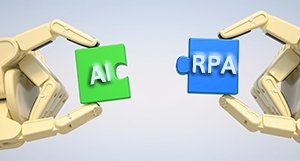
Robotic process automation (or RPA) is an emerging form of clerical process automation technology based on the notion of software robots or artificial intelligence (AI) workers. The easiest way to describe RPA is as software that mimics human behaviour.
Artificial intelligence (AI), on the other hand, is an umbrella term for a machine’s ability to imitate a human’s way of sensing things, make deductions and communicate.
AI solutions often make use of the methods of machine learning. A machine can, for instance, be taught to identify phenomena with the help of mathematical and statistical methods.
One of the key differences between RPA and AI / ML is that RPA solutions are limited to handling rule-based work and need digitised and structured inputs. Many organisation however have to deal with judgement-based processes and unstructured inputs.
RPA or AI: A choice, not an alternative
Whether to use RPA or AI, or both together is just a set of choices based on the specific demands. The two technologies complement each other very well; for example, by using AI to structure the unstructured data at the beginning of the process, and then by using the robots to process the transactions, and at the end using AI for decision making and data analytics
RPA is more focused on replacing humans from doing repetitive tasks. For example data entry, accounting input and reconciliation, time sheet / checking and movement of large amounts of data across multiple applications (used for GDPR). RPA will make a huge difference to a large business as they will be able to process vast amounts of data accurately without the need for manual inputting. This will free up staff to focus on more “intelligent” things that will add value rather than data entry.
There are a lot of new things being spoken about but in essence it can be argued that until you get to the very high end there’s not a huge difference between RPA & AI. Some people call RPA “AI” & others call AI “RPA”. The technical description of deep learning / AI is Machine Learning — An Approach to Achieve Artificial Intelligence…. Machine Learning at its most basic is the practice of using algorithms to parse data, learn from it, and then make a determination or prediction about something. This can also be done within RPA (for example recognising different invoices) and moving/entering them in the right places in your ERP system.
Deep learning is the “new thing”, it takes computer intelligence even further. It uses massive amounts of data and computing power to simulate Deep Neural Networks. Essentially, these networks imitate the human brain’s connectivity, classifying data sets and finding correlations between them. With its newfound knowledge (acquired without human intervention), the machine can then apply its insights to other data sets. The more data the machine has at its disposal, the more accurate its predictions will be.
